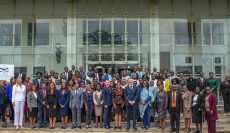 Human nature dictates that there will be conflict, on various scales of intensity, for as long as there are interactions among humans. These conflicts may be between individuals and within families, organizations and between states. Community mediation is a form of mediation aimed at solving disputes that may arise largely within a community but in certain instances between different communities. The dispute is ideally mediated by a member of the community who understands how the community functions.
Human nature dictates that there will be conflict, on various scales of intensity, for as long as there are interactions among humans. These conflicts may be between individuals and within families, organizations and between states. Community mediation is a form of mediation aimed at solving disputes that may arise largely within a community but in certain instances between different communities. The dispute is ideally mediated by a member of the community who understands how the community functions.
Mediation at a community level is readily accepted as a method of dispute resolution as the parties to the dispute feel that they are among individuals who share similar beliefs, cultures and eliminates any possibility of a language barrier.
Earlier in the month of August, SDRC had the opportunity to interact with one of Kenya’s most active Community based mediation body, the National Conciliation and Arbitration Board (NCAB) of Kenya. SDRC conducted a one-day mediation refresher training for the members of the NCAB. The training was aimed at refreshing the members’ mediation skills and to update them on the current trends in the practice of mediation. The content and delivery of the course was focussed on the experiences that the participants and the trainers had in the field. The members received training on basic mediation skills and had the opportunity to practically apply the skills in a series of role play sessions. The mediators in each role play received constructive feedback on how they had gone about their role from SDRC trainers and the spectating members of the CAB. The training provided an excellent platform for the exchange of ideas, advice and techniques amongst the individuals in attendance based on their experience in the practice.
CAB Kenya offers free mediation services to any member of the Ismaili sect seeking its assistance on mostly marital, family and commercial matters. The mediators assigned to each case are drawn from the trained members of the NCAB. The Board also offers trainings to members to sensitive them on the benefits of settling disputes outside of litigation. The Board is made up of members OF THE Ismaili community from various professional, economic and professional backgrounds. The members all offer their services on a voluntary basis outside their work hours.
The Conciliation and Arbitration Boards (CABs) were created by His Highness the Aga Khan to encourage the Ismaili community to resolve any disputes without going through litigation, while taking into account the amiable nature of mediation and the adversarial nature of litigation which has an impact on community harmony. There are various CABs worldwide, working at either an international, national or regional level. The Board is established under Article 13 of the Ismaili Constitution and is endorsed by the Qur’an which promotes mediation as a proper way to solve disputes. The Qur’an directs, “If two parties of the believers fight, make peace between them.” (49:9).
 NCAB has enjoyed an impressive rate success rate with over 100 disputes being amicably resolved between the years 2010 and 2012. According to Rosemin Bhanji, Chairperson of NCAB, the community has no qualms about approaching NCAB to resolve their disputes as they know that the CABs are based on the principle of universal brotherhood and are endorsed by the Qur’an and His Excellency the Aga Khan. They also trust the process of mediation as they are assured that they will have neutral, qualified mediators and pay less in terms of costs for a faster and more confidential solution as compared to litigation.
NCAB has enjoyed an impressive rate success rate with over 100 disputes being amicably resolved between the years 2010 and 2012. According to Rosemin Bhanji, Chairperson of NCAB, the community has no qualms about approaching NCAB to resolve their disputes as they know that the CABs are based on the principle of universal brotherhood and are endorsed by the Qur’an and His Excellency the Aga Khan. They also trust the process of mediation as they are assured that they will have neutral, qualified mediators and pay less in terms of costs for a faster and more confidential solution as compared to litigation.
NCAB is definitely a pacesetter and a premier role model in amicable community dispute resolution in Kenya and East Africa.





